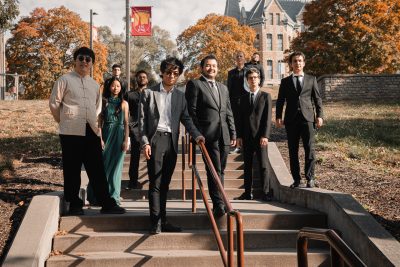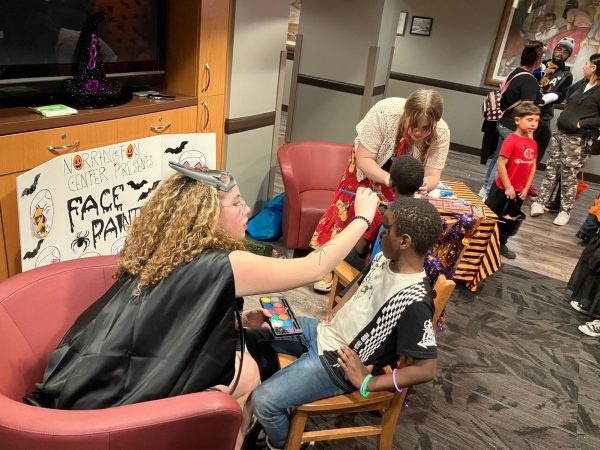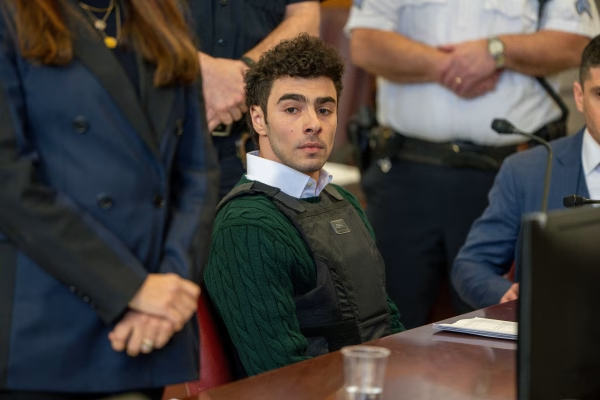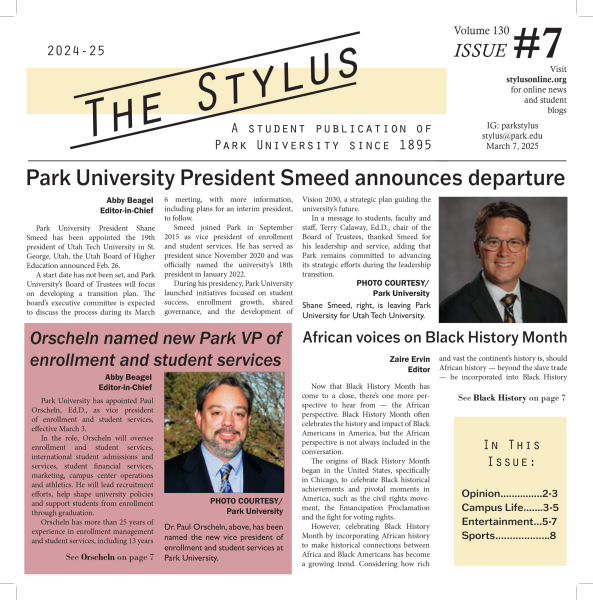Students face setbacks from success advising
There’s frustration bubbling up around academic advising at Park University and everyone involved has a grievance.
Students say they aren’t receiving good advice from success coaches, and feel like they aren’t being heard when they bring up those issues. Administrators say these student issues are individual anecdotes caused by unique situations and not widespread. They recommend students to better inform themselves about their academic programs and speak up when something goes wrong.
What’s clear is that there is a disconnect when it comes to success advising.
Park University offers a success coach to every student. Coaches can help students get enrolled in classes, understand the resources Park offers to students and, in general, navigate their degree plan.
In theory, this seems like a helpful resource, but students say it’s not as useful as they would like.
Tieisha Bradley, senior biology major, has experienced several issues. She said her student success coach put her on a path for a bachelor of arts degree, which is a very different path than a bachelor of science degree, which is what she wanted to pursue. Biology offers both degree programs.
Bradley added that she tried to have a conversation with her success coach about the situation, but it felt like she wasn’t listening or checking the degree plan.
“I had been taking classes for almost a year and a half that I didn’t need,” Bradley said. “I ended up paying more thousands of dollars out of packet than (I actually) needed.”
Bradley transferred from Kansas State University. She said that she was put in two classes at Park that she took there, but her success coach told her they couldn’t transfer those credits. However, after she took those courses, another success coach informed her that the classes actually had transferred, so she had taken unnecessary classes.
Katherine Renner is the director of student success, but she is currently out on maternity leave. Her supervisor is Andrew Davis, associate vice president of enrollment management. He addressed student concerns with success advising in Renner’s absence.
Davis said, “I think when there’s a mistake, that it can be interpreted lots of different ways.”
Alysa Mendez, junior biology major, said she understands that the success coaches work with a lot of students, but she feels like they should be more helpful when scheduling students for class, especially when it comes to understanding class rotations for various majors. She said, “Sometimes there’s classes that we need to take, that are requirements, and they’re only offered like, every fall or every two years.”
She feels like she should have been put in some of these classes before her success coach put her in other classes because of how infrequently they are offered.
Davis said, “Each student’s experience being different would highlight to me that sometimes there’s a desire and a want, that might not be possible, and so if a student is getting information that they don’t like, that can be a cause for dissatisfaction.”
He added that there are a lot of variables at hand. These include students feeling like they are put in the wrong class, but it’s actually the right one because of the sequencing needed. The timing of enrollment may be off or a class may be canceled. He said many different factors could occur and it will be a unique experience for each student.
Hannah Pappert, a senior double majoring in English and communication studies, said, “I’ve had some good experiences with success coaches, and I’ve had some pretty poor ones.”
She said that the hardest part has been making sure she takes her classes at the right time in the rotation.
“Sometimes they’ll (student success coaches) recommend something (a class) that if you don’t go back and check and make sure it fits in your graduation schedule, you could be taking a class that either you don’t need or that will throw you completely off (schedule) graduation wise,” Pappert said.
However, she also said that her success coach always put her at ease because she would fix her schedule right away when Pappert noticed errors.
These errors have occurred very frequently for Pappert.
“Almost every single semester I have had to call student success and/or email a specific success coach and get a problem fixed,” she said.
Because of how often issues have occurred, Pappert said it has crossed her mind that these mistakes could be done on purpose.
“Sometimes I do wonder if, like, Park doesn’t educate their students on how to use these resources and how to know what classes are required because they want to extend students past the four-year mark,” she said.
However, Davis said that this is not the goal of anyone at Park.
“We don’t want students to take longer than they want, and we don’t want students to be delayed in their path towards success,” he added.
Pappert has some ideas of how Park could better educate their students on the resources available to them. She said she had professors who made her do a four-year degree plan in her freshman year, and that has helped her many times. She thinks all students should have this opportunity in their LE100 classes. In addition, she thinks all students should be better educated on what the student success department does, how to read their degree audit and the rotation that their majors are on. These ideas could be taught in LE100 courses or covered during Get on Board Day.
Pappert also thinks that if courses are on a difficult rotation, then that should be shown on the website where students can look up classes. She thinks it would make students’ lives easier if they knew while picking their classes that a course is offered on a certain rotation and won’t be offered again for several semesters.
These ideas may help Park students in the future, but issues could still occur. Davis says that if a student has issues, they should turn to their student success coach first, as he believes one of the coaches will almost always be able to solve the issue. However, “if remediation isn’t satisfactory, there’s always other avenues,” he said.
For a next step, Davis recommends that students talk to their faculty advisor, if one is assigned. After that, if a student still has a grievance or wants to report a wrongdoing, then he says they can talk to Amanda Bryant in the Student Advocate office. If students still do not feel helped, he said that they can go to Jayme Uden, Park’s dean of students, or Dr. Michelle Myers, Ed.D, Park’s provost.
“If there’s truly a mistake and wrongdoing, we need to correct that,” said Davis. “We want students to make us better.”
Your donation will support the student journalists of Park University. Your contribution will allow us to cover our annual website hosting costs, freeing up other funds for equipment, printing and training.









